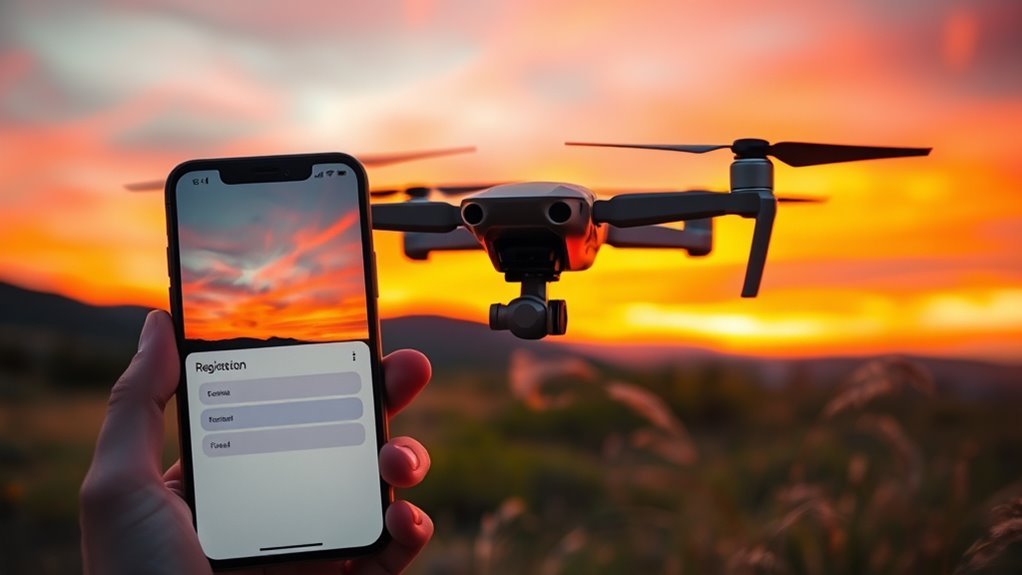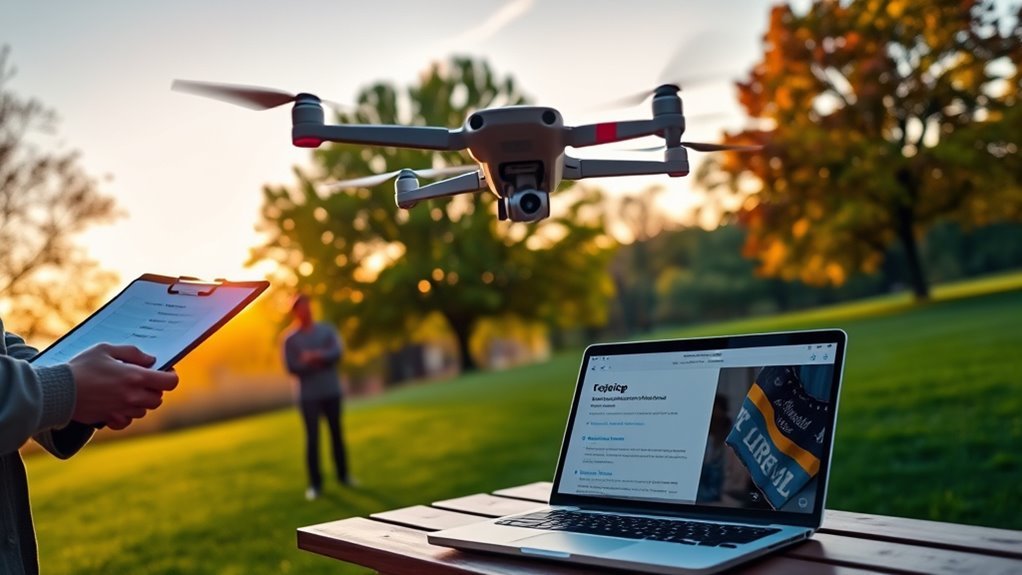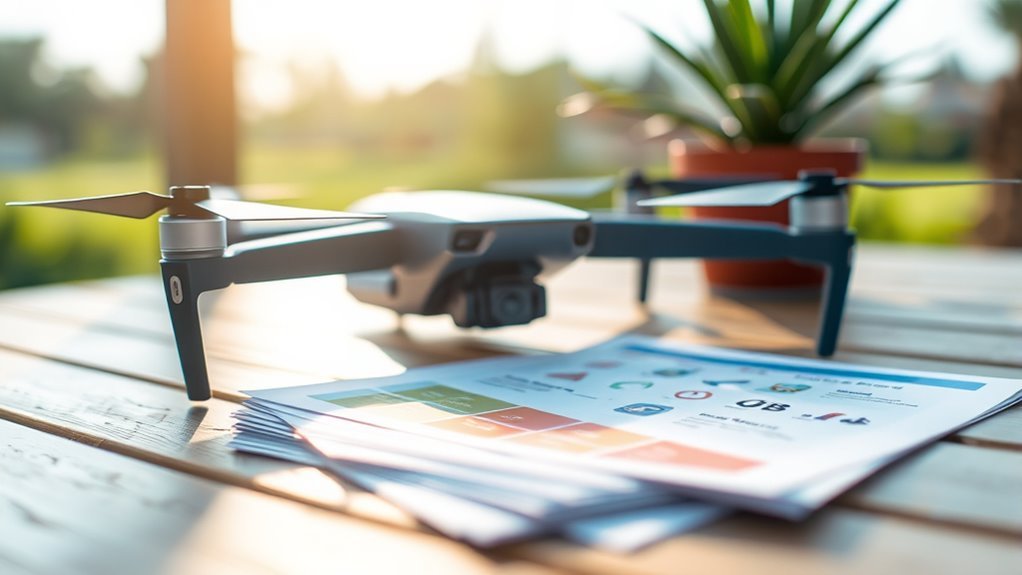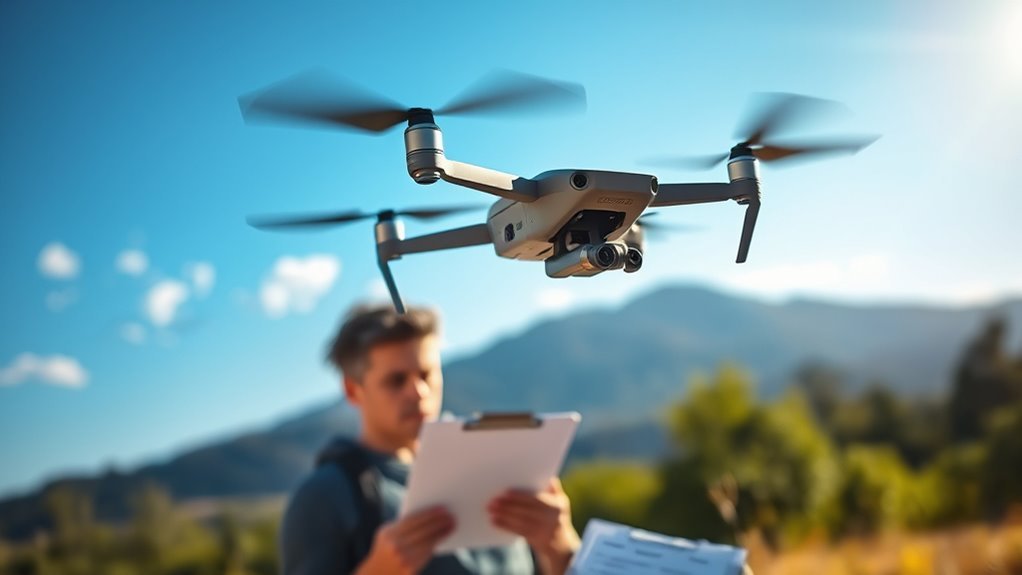If your drone weighs over 0.55 pounds, you must register it with the FAA. Start by visiting the FAA’s website to create an account. You’ll need your personal information and details about your drone, including its make and model. After verifying the weight, pay the registration fee, usually around $5. Once registered, display your unique identification number on the drone. To learn more about the benefits and consequences of registration, keep exploring this topic.
Understanding Drone Registration Requirements

When it comes to flying drones, understanding the registration requirements is essential for compliance and safety. Different drone types can have distinct registration processes, so knowing your specific model is important. If your drone weighs over 0.55 pounds, you must register it with the FAA. The registration process is straightforward—you can complete it online, providing key details like your drone’s make and model. Once registered, you’ll receive a unique identification number, which must be displayed on your drone. This step not only guarantees you’re following regulations but also supports the freedom to fly responsibly. By grasping these requirements, you can enjoy your flying experience without the worry of penalties or legal issues.
Who Needs to Register a Drone?

Who exactly needs to register a drone? If you’re a drone owner flying for recreational or commercial purposes, registration is essential. It not only guarantees compliance with regulations, but also promotes responsible drone ownership.
Here’s a quick overview:
| Type of User | Registration Requirement |
|---|---|
| Recreational Flyers | Yes |
| Commercial Operators | Yes |
| Manufacturers | Yes |
| Government Agencies | Yes |
| Hobbyists (under 0.55 lbs) | No (but recommended) |
Understanding the registration significance helps you avoid penalties and promotes safety in the skies. Be certain you’re aware of your responsibilities as a drone owner to enjoy your flights freely and legally!
Exemptions From Drone Registration

When it comes to drone registration, not every device requires it under specific conditions. For example, drones that fall below a certain weight limit, those used solely for educational purposes, or those classified as model aircraft may be exempt from registration. Understanding these exemptions is essential for compliance and to avoid unnecessary paperwork.
Weight Limit Criteria
Although many drones are required to be registered with the FAA, there are specific weight criteria that can exempt certain models from this requirement. If your drone falls under the weight limit, you can enjoy the freedom of flying without the hassle of registration. Here’s what you need to know about weight classification:
- Drones weighing less than 0.55 pounds (250 grams) are typically exempt.
- Check your drone specifications to verify compliance with this weight limit.
- Always confirm whether modifications affect the weight classification.
Understanding these criteria can help you navigate the regulations effectively while still enjoying your drone hobby. So, if your drone fits within these limits, you can fly freely without the burden of registration!
Educational Purposes Exception
While many drone enthusiasts find themselves maneuvering through the registration requirements, there’s an exception for those using drones for educational purposes. Educational exemptions allow you to operate drones without the usual registration if you’re using them in a school or training environment. This flexibility promotes learning and innovation in drone technology.
Here’s a quick overview of the educational exemptions:
| Criteria | Description | Examples |
|---|---|---|
| Purpose | Educational use only | Classroom projects |
| Age Requirement | No specific age limit | Students of all ages |
| Supervision | Must be supervised by an instructor | Teacher-led activities |
| Drone Size | Must comply with weight limits | Under 55 lbs |
| Flight Location | Restricted to controlled environments | School grounds |
Understanding these parameters can help you maximize your drone use while staying compliant.
Model Aircraft Regulations
If you’re passionate about flying model aircraft, you might be pleased to know that certain regulations exempt these from standard drone registration. As long as you adhere to specific criteria, you can enjoy your model aircraft operations without the hassle of registration. Here are some key points to keep in mind:
- Your aircraft must weigh less than 55 pounds.
- It should be flown strictly for recreational purposes.
- You need to follow safety guidelines, ensuring you’re flying in designated areas away from people and property.
Step-by-Step Registration Process
To register your drone effectively, you’ll need to follow a clear, systematic process that guarantees compliance with Federal Aviation Administration (FAA) regulations. Start by visiting the FAA’s website and create an account for the online registration process. You’ll need to provide basic information about yourself and your drone, including its make and model. Keep these drone registration tips in mind: double-check your details for accuracy and verify your drone weighs between 0.55 and 55 pounds, as this is the registration requirement. After submitting your information, pay the registration fee and receive your unique registration number via email. Finally, make certain to display this number clearly on your drone, ensuring you’re ready to enjoy flying freely while staying compliant.
Fees Associated With Drone Registration
What costs should you expect when registering your drone? Understanding the registration costs and potential drone taxes can help you budget effectively. Most importantly, the FAA charges a nominal fee for registration, but there are a few other costs to take into account:
- Registration Fee: Typically, it’s around $5 for registering your drone online.
- Renewal Fees: If you need to renew your registration, be prepared for similar costs every three years.
- Drone Taxes: Depending on your state, you might encounter local taxes or fees associated with drone ownership.
Benefits of Registering Your Drone
Registering your drone not only guarantees you’re compliant with legal regulations but also enhances the overall safety of your flying experience. By keeping your drone on the official registry, you’re demonstrating responsibility, which can help in case of any incidents or disputes. Furthermore, registered drones often benefit from specific protections and privileges under the law, making your flights smoother and more secure.
Legal Compliance Advantages
While many drone enthusiasts may overlook the importance of registration, doing so can greatly enhance your legal standing and compliance with federal regulations. By registering your drone, you reveal several legal advantages and compliance benefits that can protect your interests and rights as a pilot.
- Avoid fines: Stay clear of hefty penalties that come from flying unregistered drones.
- Insurance eligibility: Open doors to insurance options that could save you financially in case of an incident.
- Legitimacy: Gain credibility in the drone community and among potential clients if you’re using your drone for commercial purposes.
In short, registering your drone isn’t just a legal formality—it’s a smart move to guarantee your freedom to fly responsibly and legally.
Enhanced Safety Measures
If you want to take your drone flying to the next level, registering your drone can greatly enhance safety measures. By registering, you’ll adhere to established safety protocols, which not only protects you but also others around you. It allows you to be part of a community that prioritizes responsible flying. You’ll have access to important updates on regulations and best practices, helping you tailor your flying experience to minimize risks. This proactive approach to risk management can markedly reduce accidents and enhance your freedom to fly. Plus, in the event of an incident, having a registered drone can simplify accountability and recovery. Embrace these benefits to guarantee a safer, more enjoyable flying experience.
Consequences of Not Registering Your Drone
Flying an unregistered drone can lead to serious consequences that you might not be fully aware of. Ignoring registration can result in penalties incurred and enforcement actions that can seriously affect your freedom to fly. Here are a few potential repercussions:
- Fines: You could face hefty fines for non-compliance, which can quickly add up.
- Seizure of Equipment: Authorities may confiscate your drone, leaving you without your equipment.
- Legal Trouble: You may find yourself facing legal action, which could lead to even more severe consequences.
Understanding these risks is essential if you want to enjoy flying without the looming threat of penalties and enforcement actions. Registering your drone isn’t just a formality; it’s a safeguard for your freedom and enjoyment in the skies. Additionally, compliance with Connecticut’s drone regulations is crucial to avoid significant penalties.
Resources for Additional Information
Maneuvering the world of drone registration can be overwhelming, but there are numerous resources available to help you understand the process and stay compliant. The Federal Aviation Administration (FAA) website is your primary source for registration guidelines, ensuring you’re up-to-date with national requirements. Local regulations can vary, so check with your city or state’s aviation authority for specific rules that may apply. Joining online forums or community groups can also provide valuable insights from experienced drone users. Additionally, consider researching drone insurance options to protect yourself from potential liabilities. Staying informed not only helps you navigate registration but also empowers you to fly freely, knowing you’re following the rules that keep the skies safe for everyone. It’s also important to be aware of no-fly zones to ensure compliance with local regulations and avoid potential penalties. Understanding how advanced algorithms manage payloads can further enhance your operational knowledge and safety while flying.
Frequently Asked Questions
Can I Fly a Drone Without Registration in Remote Areas?
You can fly a drone in remote areas, but you still need to adhere to drone regulations. Make sure you’re aware of any local laws, as they can affect your flying freedom considerably.
How Do I Update My Drone Registration Information?
You’ve probably imagined freedom while flying your drone, but updating your drone registration information is crucial. Just visit the FAA’s website, follow the drone registration process, and make certain your details are current and accurate.
Is There an Age Limit for Registering a Drone?
Yes, there are age restrictions for drone registration requirements. You need to be at least 13 years old to register a drone under your name, ensuring responsible ownership while still enjoying the freedom of flying.
What Happens if My Drone Gets Lost After Registration?
If you’ve lost your drone, remember, “A stitch in time saves nine.” Utilize drone recovery options, like GPS tracking, to improve chances of retrieval. Always stay informed about regulations to enhance your flying freedom and safety.
Can I Register Multiple Drones Under One Account?
Yes, you can register multiple drones under one account. The registration process allows for several drone ownership entries, simplifying management. Just guarantee all your drones meet the regulatory requirements to enjoy your flying experience freely.

